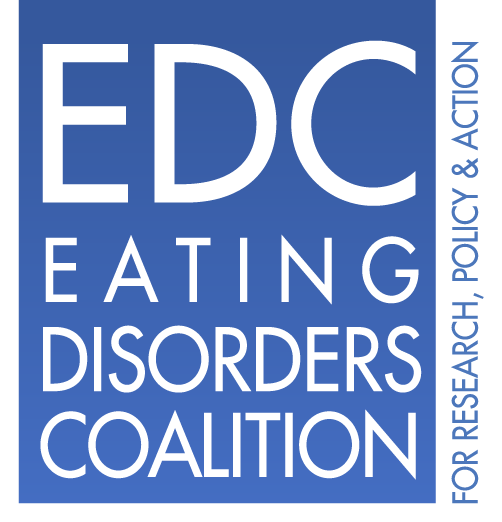PASSED EATING DISORDERS LEGISLATION
2022
Anna Westin Legacy Act: In December 2022, the bipartisan Anna Westin Legacy Act was passed through the end-of-year spending package. The Anna Westin Legacy Act will reauthorize and expand the work of the Center of Excellence for Eating Disorders as a competing continuation. With funding at $5 million over 5 years, the Anna Westin Legacy Act will provide for continued training of primary health care professionals on eating disorders screening, brief intervention, and referral to treatment (SBIRT). To learn more, view the Anna Westin Legacy Act infographic here.
2021
SERVE ACT: In December 2021, the bipartisan SERVE Act (H.R. 1309/S.194) was passed into law through the Fiscal Year 2022 National Defense Authorization Act (Public Law No: 117-81, Section 701). The legislation expands the age limit to allow active-duty military spouses and children to receive higher levels of care for eating disorders. It also requires the Department of Defense to issue guidance and regulations to help identify, treat, and rehabilitate servicemembers with eating disorders.
Increased Funding for Eating Disorders Reasearch: The EDC successfully included “eating disorders” as a topic area for the Department of Defense (DoD) Peer Reviewed Medical Research Program (PRMRP) resulting up to $7 million of available research funding for eating disorders each fiscal year.
2016
Anna Westin Act: In 2016, the bipartisan Anna Westin Act (H.R.2515/S.1865) was passed into law through the 21st Century CURES Act (Public Law 114-255, Sections 13005-13007). The bill marked the first federal eating disorder legislation passed into law- a milestone for EDC's community. The legislation requires the U.S. Department of Health and Human Services Office of Women’s Health to update published information on eating disorders, incorporating public resources into its obesity prevention programs, and advancing awareness of eating disorders. Additionally, it allows the U.S. Department of Health and Human Services (HHS) to facilitate the identification of model programs and materials for allowing and training health professionals on eating disorders. Enhancing education and training on eating disorders for health professionals in an effort to provide early intervention services, appropriate referrals, and treatment services. The Anna Westin Legacy Act was written to help those affected by eating disorders through education and training of health care professional training, improve eating disorders resources in HHS and clarify mental health parity for eating disorders insurance coverage.
WORK WITH FEDERAL AGENCIES
2021
The Eating Disorders Coalition, along with our members, the National Eating Disorders Association, the National Alliance for Eating Disorders, and REDC Consortium, met with U.S. Assistant Secretary of Health, ADM Rachel Levine to share policy recommentations the U.S. Department of Health and Human Services can take up for eating disorders awareness, education, training, and prevention. Read through the full list of recommendations here.
I am proud that, from its inception, I have been a part of the EDC and the gains we have made in increasing awareness, improving access to care, educating the public and influencing lawmakers. As the founder of the country’s first residential eating disorder treatment facility, I am thrilled that the EDC’s mission to raise recognition about the serious nature of eating disorders, not only a national level but a global one, is being accomplished.”
– Sam Menaged, Former EDC Board Member, The Renfrew Center
